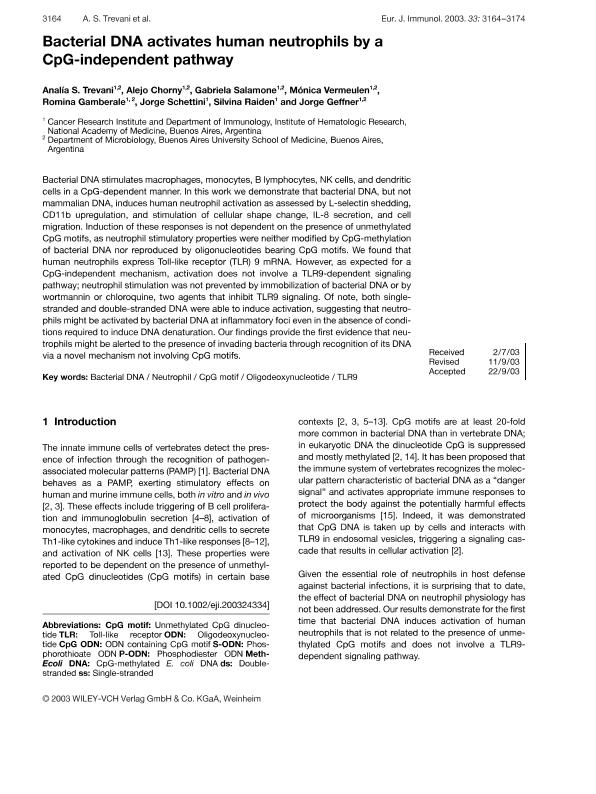Mostrar el registro sencillo del ítem
dc.contributor.author
Trevani, Analía Silvina

dc.contributor.author
Chorny, Alejo
dc.contributor.author
Salamone, Gabriela Veronica

dc.contributor.author
Vermeulen, Elba Monica

dc.contributor.author
Gamberale, Romina

dc.contributor.author
Schettini, Jorge
dc.contributor.author
Raiden, Silvina Claudia

dc.contributor.author
Geffner, Jorge Raúl

dc.date.available
2020-01-14T18:26:51Z
dc.date.issued
2003-11
dc.identifier.citation
Trevani, Analía Silvina; Chorny, Alejo; Salamone, Gabriela Veronica; Vermeulen, Elba Monica; Gamberale, Romina; et al.; Bacterial DNA activates human neutrophils by a CpG‐independent pathway; Wiley VCH Verlag; European Journal of Immunology; 33; 11; 11-2003; 3164-3174
dc.identifier.issn
0014-2980
dc.identifier.uri
http://hdl.handle.net/11336/94630
dc.description.abstract
Bacterial DNA stimulates macrophages, monocytes, B lymphocytes, NK cells, and dendritic cells in a CpG‐dependent manner. In this work we demonstrate that bacterial DNA, but not mammalian DNA, induces human neutrophil activation as assessed by L‐selectin shedding, CD11b upregulation, and stimulation of cellular shape change, IL‐8 secretion, and cell migration. Induction of these responsesis not dependent on the presence of unmethylated CpG motifs, as neutrophil stimulatory properties were neither modified by CpG‐methylation of bacterial DNA nor reproduced by oligonucleotides bearing CpG motifs. We found that human neutrophils express Toll‐like receptor (TLR) 9 mRNA. However, as expected for a CpG‐independent mechanism, activation does not involve a TLR9‐dependent signaling pathway; neutrophil stimulation was not prevented by immobilization of bacterial DNA or by wortmannin or chloroquine, two agents that inhibit TLR9 signaling. Of note, both single‐stranded and double‐stranded DNA were able to induce activation, suggesting that neutrophils might be activated by bacterial DNA at inflammatory foci even in the absence of conditions required to induce DNA denaturation. Our findings provide the first evidence that neutrophils might be alerted to the presence of invading bacteria through recognition of its DNA via a novel mechanism not involving CpG motifs.
dc.format
application/pdf
dc.language.iso
eng
dc.publisher
Wiley VCH Verlag

dc.rights
info:eu-repo/semantics/openAccess
dc.rights.uri
https://creativecommons.org/licenses/by-nc-sa/2.5/ar/
dc.subject
BACTERIAL DNA
dc.subject
CPG MOTIF
dc.subject
NEUTROPHIL
dc.subject
OLIGODEOXYNUCLEOTIDE
dc.subject
TLR9
dc.subject.classification
Inmunología

dc.subject.classification
Medicina Básica

dc.subject.classification
CIENCIAS MÉDICAS Y DE LA SALUD

dc.title
Bacterial DNA activates human neutrophils by a CpG‐independent pathway
dc.type
info:eu-repo/semantics/article
dc.type
info:ar-repo/semantics/artículo
dc.type
info:eu-repo/semantics/publishedVersion
dc.date.updated
2019-10-10T19:32:10Z
dc.journal.volume
33
dc.journal.number
11
dc.journal.pagination
3164-3174
dc.journal.pais
Alemania

dc.journal.ciudad
Weinheim
dc.description.fil
Fil: Trevani, Analía Silvina. Academia Nacional de Medicina de Buenos Aires; Argentina. Consejo Nacional de Investigaciones Científicas y Técnicas; Argentina. Universidad de Buenos Aires. Facultad de Medicina. Departamento de Microbiología; Argentina
dc.description.fil
Fil: Chorny, Alejo. Academia Nacional de Medicina de Buenos Aires; Argentina. Universidad de Buenos Aires. Facultad de Medicina. Departamento de Microbiología; Argentina
dc.description.fil
Fil: Salamone, Gabriela Veronica. Academia Nacional de Medicina de Buenos Aires; Argentina. Universidad de Buenos Aires. Facultad de Medicina. Departamento de Microbiología; Argentina. Consejo Nacional de Investigaciones Científicas y Técnicas; Argentina
dc.description.fil
Fil: Vermeulen, Elba Monica. Universidad de Buenos Aires. Facultad de Medicina. Departamento de Microbiología; Argentina. Consejo Nacional de Investigaciones Científicas y Técnicas; Argentina. Academia Nacional de Medicina de Buenos Aires; Argentina
dc.description.fil
Fil: Gamberale, Romina. Universidad de Buenos Aires. Facultad de Medicina. Departamento de Microbiología; Argentina. Consejo Nacional de Investigaciones Científicas y Técnicas; Argentina. Academia Nacional de Medicina de Buenos Aires; Argentina
dc.description.fil
Fil: Schettini, Jorge. Academia Nacional de Medicina de Buenos Aires; Argentina
dc.description.fil
Fil: Raiden, Silvina Claudia. Consejo Nacional de Investigaciones Científicas y Técnicas; Argentina. Academia Nacional de Medicina de Buenos Aires; Argentina
dc.description.fil
Fil: Geffner, Jorge Raúl. Universidad de Buenos Aires. Facultad de Medicina. Departamento de Microbiología; Argentina. Academia Nacional de Medicina de Buenos Aires; Argentina. Consejo Nacional de Investigaciones Científicas y Técnicas; Argentina
dc.journal.title
European Journal of Immunology

dc.relation.alternativeid
info:eu-repo/semantics/altIdentifier/url/https://onlinelibrary.wiley.com/doi/full/10.1002/eji.200324334
dc.relation.alternativeid
info:eu-repo/semantics/altIdentifier/doi/http://dx.doi.org/10.1002/eji.200324334
Archivos asociados
